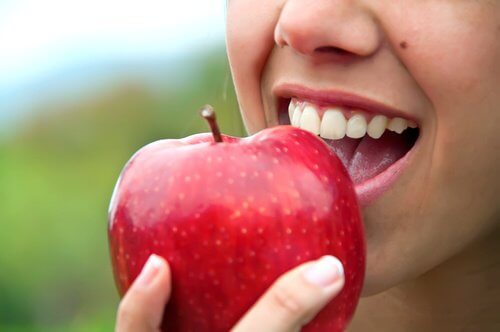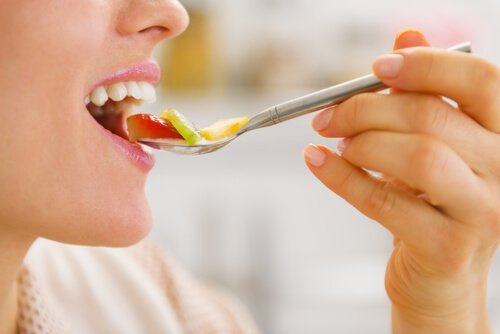Should You Eat Fruit after Dinner?

There are some votes in favor and others against eating fruit after dinner or at night in general. Some people say fruit isn’t technically a dessert; others think it’s better to eat fruit before dinner. And of course, plenty of people believe that eating an apple, pear, or banana after dinner can be a simple and sweet treat.
In today’s article we’ll clear up this mystery. Don’t change the page!
Eating fruit before dinner
You’ve probably been taught to eat savory things first, followed by sweet foods. But some people think that, in order to avoid problems with digestion, it’s better to eat sweet things like fruit before your dinner.
Why? Because it will make you feel more full and satisfied. That’s great if you’re on a diet and don’t want to put on two pounds before you go to bed. Some people eat a lot of food for dinner, and that’s not good for your overall health.
On the other hand, if you choose to eat fruit after dinner, you’re adding up the calories contained in these fruits and they won’t help you maintain your weight or lose a single pound. From a nutritional point of view, eating fruit after dinner doesn’t help you with weight loss the same way it does during the day.
This is because fruits help speed up your metabolism, but this only happens when you’re active. If you’re lying on the sofa or in bed asleep, your metabolism is always going to work slower.
Fruits provide your body with:
- Calcium
- Phosphorus
- Iron
- Antioxidants
- Sugar
- Fat (in small quantities)
- Carbohydrates
- Vitamins

Most of the nutrients we listed above are lost during your digestion thanks to the fermentation of the sugar in fruits. That’s why a lot of people feel sick when they eat fruit.
It’s not a great idea to eat fruit whenever you want during the day either, because fruit contains a substance known as fructose that the body turns into glucose and energy. If you don’t use it up, your body stores it as fat.
See also:
The advantages and disadvantages of eating fruit after dinner
Let’s start with a list of why fruits can be an excellent option for dessert:
- They’re a healthy and delicious snack when you don’t eat them excessively.
- They contain vitamins, nutrients, and minerals that your body needs.
- They help reduce the risk of serious diseases.
- Fruits help you maintain a healthy weight.
- They’re a better alternative to desserts filled with processed sugars, other sweets, and more.
- They can help satisfy your appetite so you don’t eat as much at night.
 As for the cons:
As for the cons:
- Since most fruits contain sugar, the sugar spike they produce in the bloodstream isn’t recommended for people who suffer from diabetes.
- They can interfere with your weight loss goals if you replace any other food item with fruit.
So when is the best time to eat fruit?
Considering all the information above, we just have one question (and undoubtedly you do too): when can you eat fruit? As everyone knows, it’s good for your health, but the theory that you shouldn’t eat it for dessert is a bit confusing.
Here’s the answer: it’s best to eat fruit in the morning. And naturally, we’ll give you plenty of information to back up this claim.
Eating fruit at breakfast is a great way to start your day with a healthy dose of natural energy. Your metabolism works the fastest until noon because this is usually the time that you’re most active during the day.

Remember fruits have a low fat content, so it’s not a good idea to only limit yourself to these foods in the morning. Your body needs carbohydrates as well, and especially fiber.
But in addition to eating your fruit in the morning, you can also eat them as an afternoon snack. They’re perfect for when your “battery is running low” and you still have tons of things to do, like going to the gym after work, night classes, or when your family is waiting for you at home.
Fruits are an essential component of your diet, as long as you eat them correctly. Everything depends on your personal body type and how much you eat.
For example, if you want to have a few grapes after dinner, that’s fine, but avoid something heavier like a banana.
Helpful guidelines you should remember
Always have a variety of healthy and natural smack options available for when you’re running low on energy, and then remember these central principles:
- Eat fruit before dinner
- Eat fruit at breakfast
- And eat fruit in the afternoon
- Also, let’s add one more: eat fruit by itself
This is how you can take the best advantage of the nutrients contained in these delicious natural foods. By doing so, you’ll be avoiding the following issues:
- Indigestion
- A heavy stomach
- Weight gain
- Acidity
- Stomach aches
- Lack of nutrients
And now, one last tip: don’t mix different types of fruits together. For example, sour and sweet fruits. Try sticking to one type at a time. And always eat fresh fruits – avoid those that are canned, processed, frozen, or sold in the grocery store as juice. Whenever possible, buy organic fruits.
All cited sources were thoroughly reviewed by our team to ensure their quality, reliability, currency, and validity. The bibliography of this article was considered reliable and of academic or scientific accuracy.
- Sun, J., Chu, Y., Wu, X., & Liu, R. (2002). Actividades antioxidantes y antiproliferativas de algunas frutas. J Agric Food Chem. https://doi.org/10.1021/jf8018529
- Los compuestos bioactivos de las frutas y sus efectos en la salud. https://www.sciencedirect.com/science/article/pii/S1138032208756232
- Keller, K., Rodríguez López, S., & Carmenate Moreno, M. (2015). ¿Cómo se asocian las conductas de consumo de alimentos con la ingesta de frutas y verduras en adultos Españoles? Nutricion Clinica y Dietetica Hospitalaria. https://doi.org/10.12873/351keller
- Cardiology, A. C. of. (2012). Alimentación saludable: La dieta DASH-[Healthy Eating: The DASH Diet]. Cardiology American College. https://www.cardiosmart.org/~/media/Documents/Fact%20Sheets/es-US/zx1344.ashx
This text is provided for informational purposes only and does not replace consultation with a professional. If in doubt, consult your specialist.








